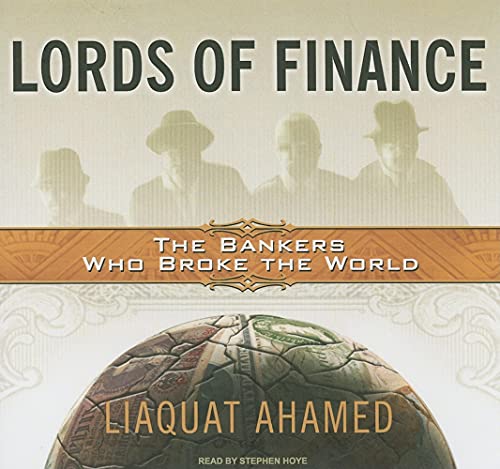Items related to Lords of Finance: The Bankers Who Broke the World

In Lords of Finance, we meet the neurotic and enigmatic Montagu Norman of the Bank of England, the xenophobic and suspicious Émile Moreau of the Banque de France, the arrogant yet brilliant Hjalmar Schacht of the Reichsbank, and Benjamin Strong of the Federal Reserve Bank of New York, whose façade of energy and drive masked a deeply wounded and overburdened man. After the First World War, these central bankers attempted to reconstruct the world of international finance. Despite their differences, they were united by a common fear-that the greatest threat to capitalism was inflation-and by a common vision that the solution was to turn back the clock and return the world to the gold standard.
For a brief period in the mid-1920s, they appeared to have succeeded. The world's currencies were stabilized, and capital began flowing freely across the globe. But beneath the veneer of boomtown prosperity, cracks started to appear in the financial system. The gold standard that all had believed would provide an umbrella of stability proved to be a straitjacket, and the world economy began that terrible downward spiral known as the Great Depression.
As yet another period of economic turmoil makes headlines today, the Great Depression and the year 1929 remain the benchmark for true financial mayhem. Offering a new understanding of the global nature of financial crises, Lords of Finance is a potent reminder of the enormous impact that the decisions of central bankers can have, of their fallibility, and of the terrible human consequences that can result when they are wrong.
"synopsis" may belong to another edition of this title.
Amazon Exclusive: Liaquat Ahamed on the Economic Climate
In December 1930, the great economist Maynard Keynes published an article in which he described the world as living in “the shadows of one of the greatest economic catastrophes in modern history.” The world was then 18 months into what would become the Great Depression. The stock market was down about 60%, profits had fallen in half and unemployed had climbed from 4% to about 10%.
If you take our present situation, 16 months into the current recession, we're about at the same place. The stock market is down 50 to 60 percent, profits are down 50 percent, unemployment is up from 4.5% to over 8%.
Over the next 18 months between January 1930 and July 1932 the bottom fell out of the world economy. It did so because the authorities applied the wrong medicine to what was a very sick economy. They let the banking system go under, they tried to cut the budget deficit by curbing government expenditure and raising taxes, they refused to assist the European banking system, and they even raised interest rates. It was no wonder the global economy crumbled.
Luckily with the benefit of those lessons, we now know what not to do. This time the authorities are applying the right medicine: they have cut interest rates to zero and are keeping them there, they have saved the banking system from collapse and they have introduced the largest stimulus package in history.
And yet I cannot help worrying that the world economy may yet spiral downwards. There are two areas in particular that keep me up at night.
The first is the U.S. banking system. Back in the fall, the authorities managed to prevent a financial meltdown. People are not pulling money out of banks anymore—in fact, they are putting money in. The problem is that as a consequence of past bad loans, the banking system has lost a good part of its capital. There is no way that the economy can recover unless the banking system is recapitalized. While there are many technical issues about the best way to do this, most experts agree that it will not be done without a massive injection of public money, possibly as much as $1 trillion from you and me, the taxpayer.
At the moment tax payers are so furious at the irresponsibility of the bankers who got us into this mess that they are in no mood to support yet more money to bail out banks. It is going to take an extraordinary act of political leadership to persuade the American public that unfortunately more money is necessary to solve this crisis.
The second area that keeps me up at night is Europe. During the real estate bubble years, the 13 countries of Eastern Europe that were once part of the Soviet empire had their own bubble. They now owe a gigantic $1.3 trillion dollars, much of which they won’t be able to pay. The burden will have to fall on the tax payers of Western Europe, especially Germany and France.
In the U.S. we at least have the national cohesion and the political machinery to get New Yorkers and Midwesterners to pay for the mistakes of Californian and Floridian homeowners or to bail out a bank based in North Carolina. There is no such mechanism in Europe. It is going to require political leadership of the highest order from the leaders of Germany and France to persuade their thrifty and prudent taxpayers to bail out foolhardy Austrian banks or Hungarian homeowners.
The Great Depression was largely caused by a failure of intellectual will—the men in charge simply did not understand how the economy worked. The risk this time round is that a failure of political will leads us into an economic cataclysm.
"About this title" may belong to another edition of this title.
- PublisherTantor Audio
- Publication date2009
- ISBN 10 1400141796
- ISBN 13 9781400141791
- BindingAudio CD
- Rating
Buy New
Learn more about this copy
Shipping:
US$ 8.12
From United Kingdom to U.S.A.
Top Search Results from the AbeBooks Marketplace
Lords of Finance
Book Description Condition: New. Seller Inventory # 6788788

